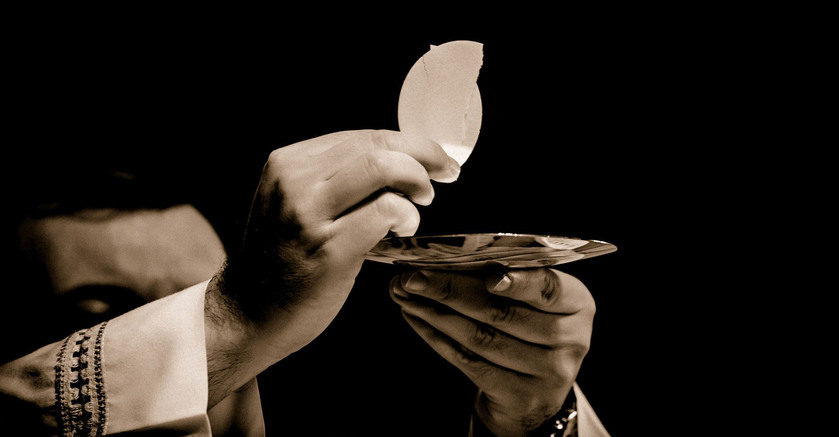Below is a short artice I wrote a while back on why Catholics are right about the Eucharist. I hope it's a blessing to you.
Catholics and Protestants have different views about the Eucharist. Catholics, like myself, believe in the real presence of Christ in the Eucharist. That Jesus is literally and wholly present—body and blood, soul and divinity—under the appearances of bread and wine—a view known as transubstantiation.
In Protestant circles, there is a range of views. While most Protestants don’t believe in transubstantiation, a majority do believe in some form of the real presence. The belief that Christ’s body and blood are really present in the Eucharist is common in Lutheran, Anglican, and Methodist circles. In Calvinist circles, it is common to say that Christ’s body and blood are spiritually received in the Eucharist, and in Baptist circles it is believed that the bread and wine only symbolize Christ’s body and blood. In other words, they hold that when Christ said “this is my body; this is my blood” he was speaking metaphorically.
While the views vary in their details, they fall into two broad classes: The belief that Christ’s body and blood are really present in the Eucharist and that they are not, meaning that they are only spiritually or symbolically present.
When Catholics and Protestants debate which view is correct, each side has its list of scriptural texts at the ready. The Catholic—and many Protestants—might point to John 6:53 where our Lord says, “Unless you eat the flesh of the Son of man and drink his blood, you have no life in you.” “What more do you need?” While a Protestant who takes the symbolic view retorts, “Yes, but in verse 63 Jesus explains that his words are meant to be interpreted spiritually, ‘It is the spirit that gives life, the flesh is of no avail; the words that I have spoken to you are spirit and life.’”
And then we go back and forth about why the scripture our interlocutor is citing doesn't actually prove what he thinks it does. Fine. The Bible is the word of God, and it is obviously a good thing when Christians want to be faithful to it.
But my point is this: both faithful Catholics and Protestants know what the Bible says, but we don’t agree on what it means. One way of solving this problem is to look more closely at the details of the text. However, we need to be sure that we are reading the text the way that the ancient audience did, and that means it’s useful to look to what the earliest Christians believed. If, for example, the earliest Christians believed that when Christ said, “this is my body; this is my blood” he meant it metaphorically, and the Catholic belief in the real, literal presence is completely unheard of until the middle ages, then it would make sense to me to go with the more ancient interpretation? Conversely, if it can be shown that the early Church did believe unanimously in the real presence of Christ in the Eucharist, and the view that the Eucharist is merely a symbol was basically unheard of until the last few centuries, then, again, I think it makes more sense to go with that ancient belief.
Now, don’t misunderstand me. I’m not equating the writings of the early Christians with the Bible. The Bible is the inspired and inerrant word of God. The writings of the early Christians are not. Individual early Christian writers no doubt believed and even taught errors. But the early Church Fathers were closer in time and culture to the apostles, and they shed important light on the question of how the original audience would have understood the text. Also, what they wrote concerning the real presence of Christ in the Eucharist is what was handed on to them from the apostolic age. And they handed that down to us through a hundred successive generations.
So, what did they hand down to us?
The first early Christian we’ll look at is St. Ignatius of Antioch, who lived in the first century and likely heard the preaching of the apostles, particularly St. John, themselves. Ignatius was named bishop of Antioch during a time when being a Christian in the Roman Empire was punishable by death, and he was actually sentenced to public execution by wild beasts. In his letter to the Christians at Smyrnaea, he tells them not to associate with certain gnostic heretics who denied that Christ really became man. In it, he discusses the Eucharist. He writes:
“Take note of those who hold heterodox opinions on the grace of Jesus Christ which has come to us, and see how contrary their opinions are to the mind of God. . . . They abstain from the Eucharist and from prayer because they do not confess that the Eucharist is the flesh of our Savior Jesus Christ, flesh which suffered for our sins and which the Father, in his goodness, raised up again” (Letter to the Smyrnaeans 6:2–7:1 [A.D. 110]).
Next we’ll look at St. Cyril of Jerusalem, who was named bishop of Jerusalem in A.D. 350 and who participated at the Council of Constantinople in 381. He was a great defender of the faith against the heresy of Arianism, which is the idea that there was a time when God the Son did not exist. Here’s what St Cyril wrote about the Eucharist:
“The bread and the wine of the Eucharist before the holy invocation of the adorable Trinity were simple bread and wine, but the invocation having been made, the bread becomes the body of Christ and the wine the blood of Christ” (Catechetical Lectures 19:7 [A.D. 350]).



















